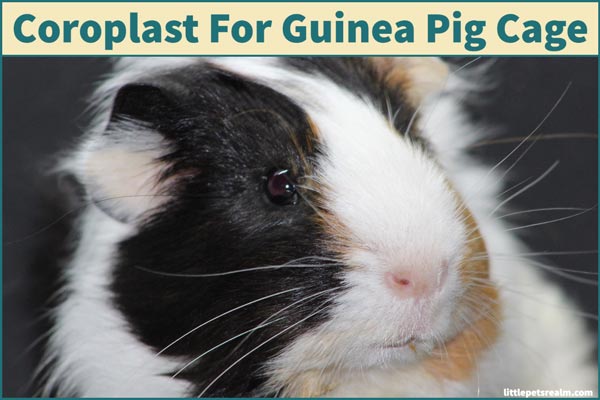As a guinea pig owner, you may have to face different problems. But, when you see that guinea pigs stink, you might ask, “Does a guinea pig smell bad?”
Guinea pigs are clean animals and they do not have a bad smell. Male guinea pigs have scent glands, but these glands do not produce a foul odor. They also groom themselves regularly, which helps to keep their fur clean and free of debris. However, if a guinea pig is not properly cared for or if its cage is not cleaned regularly, it may develop a bad odor. A guinea pig that smells bad may also be suffering from an underlying health condition.
In this article, you will know why the guinea pig smells too bad and how to control it.
In addition, find out the causes of guinea cages smelling bad and how to keep them clean.
Table of Contents
Why do your guinea pigs smell so bad?
It is a common misconception that guinea pigs smell bad. In fact, guinea pigs are relatively clean animals and do not produce a strong body odor. However, guinea pigs may produce foul smells due to different reasons.
Let’s take a look at the causes of their smelling bad.
Lack of cage cleaning
One of the main reasons guinea pigs produce a bad smell is the lack of cleaning. If their cage is not spot-cleaned regularly, it will become a breeding ground for bacteria and other microorganisms.
Improper cage cleaning or washing may lead to a messy cage as well as a bad smell.
This can also lead to skin infections, respiratory problems, and other health issues.
Not properly cared
Another reason guinea pigs may produce a bad smell is due to the lack of care. If they are not properly cared for, their fur may become matted and dirty.
This can also cause other health problems.
Dirty bedding
Another reason for the bad smell is dirty bedding. Urine, poop, remaining food, and water will stay there for a long time if you don’t clean and cause a foul smell.
In addition, not replacing bedding or washing it after a few days or a week can be responsible for it.
Moreover, if the bedding is not clean, it can lead to skin irritation and other health problems.
Improper diet
An improper diet can also cause guinea pigs to smell bad. If they are not getting enough nutrients, their fur may become dry and brittle.
This can lead to skin problems and a foul odor.
Inadequate water intake
If your guinea pigs are not drinking enough water, their urine will form a bad odor.
Moreover, their fur may become dry and generate a bad smell.
Guinea pigs getting wet
Guinea pigs should not get wet as it can lead to skin problems and a foul smell.
Know the causes of guinea pigs getting wet.
Uncleaned pee and poop
If you don’t do spot-clean to get rid of guinea pig’s pee and poop, it can lead to a bad odor.
Long-haired guinea pigs
Long-haired guinea pigs are more prone to bad smells as their fur can become matted and tangled. If you don’t wash or trim them regularly, they might get stink.
Guinea pigs not being able to groom properly
When guinea pigs are not able to properly groom themselves, it can lead to an accumulation of dirt, dust, and other debris in their fur.
They also have scent glands that produce a strong-smelling fluid. This can make them smell even worse.
Guinea pigs that are not groomed regularly can develop mats in their fur, which can trap moisture and lead to bacterial growth.
Sleeping in the litter pan or pees
Sometimes, guinea pigs like to sleep in their litter pan or pee in their bed. This can lead to a bad odor.
Grease gland
Guinea pigs have two types of scent glands, the cecum, and the grease gland. The cecum is a pouch located at the junction of the large and small intestines.
The grease gland is located on the back, near the base of the tail.
These glands secrete a waxy substance that helps to keep the fur clean and free of debris.
However, if these glands become infected, they can produce an odor.
The scent is used to mark their territory and attract mates, but it can also be very strong-smelling to humans sometimes.
Tumors
Tumors can also cause guinea pigs to smell bad. If the tumor is located near the anus, it can cause a bad smell.
Bumblefoot
Bumblefoot is a condition that causes swelling and infection in the foot. If your guinea pig has bumblefoot, it may produce a bad odor.
Dental problems
Dental problems can also cause guinea pigs to smell bad. They have very poor dental hygiene.
Your piggies are unable to brush their own teeth, so plaque and bacteria can quickly build up, leading to bad breath.
Moreover, ff the teeth are not properly cared for, they can become infected and produce a foul odor.
Wrong bedding materials
If you are using the wrong bedding materials, it can lead to a bad smell. Some bedding materials, such as cedar shavings can produce a strong bad odor and also cause skin and respiratory infections.
Check out the best bedding (paper, fleece, wood bedding) for them.
Too small cage
If guinea pigs are often kept in small cages that do not allow for adequate ventilation, this can cause the cage to become damp and smelly over time.
Moreover, some guinea pigs may poop and pee all over the place. They will walk on these and produce a foul smell from their body.
And, if you have a small enclosure, it will be dirtier and also become hard to keep clean. This will make your guinea pig stinks.
Health problems
They are susceptible to a number of health problems that can cause them to develop an unpleasant smell.
For example, guinea pigs can develop skin infections or abscesses that release pus or other foul-smelling discharge.
If your guinea pig smells bad and is also exhibiting other symptoms such as lethargy, appetite loss, and weight.
In addition, guinea pigs can suffer from gastrointestinal problems that lead to diarrhea or flatulence.
Moreover, if you have a male guinea pig, his urine may become smelly if he has a certain medical condition such as sperm rod, anal impaction, cystitis, or UTI.
While these health issues can make guinea pigs smell bad, they are usually easily treatable with the help of a veterinarian.
How do you stop your guinea pig from smelling?
If your guinea pig smells bad, there are a few things you can do to try and improve the situation.
Clean the cage deeply
First, check their habitat to make sure it is clean and free of any waste. If it is time for a cage cleaning, be sure to do a thorough job.
Clean cages should be emptied and scrubbed at least once a week. If the cage is dirty, clean it as soon as possible.
You should also wipe out the cage with a pet-safe disinfectant. A simple way to do that is using a solution of water and vinegar.
This will help to remove dried urine, bacteria, or odor-causing debris.
Moreover, you should clean the cage deeply every week.
Keep your guinea pig clean
Next, you will need to focus on keeping your guinea pig clean. Guinea pigs should be brushed at least once a week to remove any dirt, debris, and mats from their fur.
They also need to have their nails trimmed on a regular basis.
Trim long-haired guinea pig
If you have a long-haired guinea pig, you may need to trim and brush out the fur regularly. This will help to prevent mats and tangles from forming.
Clean and wash guinea pig’s bedding
You need to wash your guinea pig’s bedding regularly if you use fleece.
Use hot water and a mild detergent on bedding made of fleece, fabric, or other materials that can be washed.
Be sure to rinse the bedding thoroughly to remove all traces of detergent.
Moreover, if your fleece bedding doesn’t wick, this won’t absorb moisture.
So, make sure you wick them.
Change bedding regularly
You should also change your guinea pig’s bedding regularly if you use aspen, pine, or wood shavings.
You have to replace paper bedding as well regularly.
Moreover, replace any soiled or wet bedding immediately.
Try giving your guinea pig a bath
You may also want to try giving your guinea pig a bath. Try bathing your guinea pig once a month in summer and every two months in winter to help keep them smelling fresh.
Use a mild shampoo designed specifically for guinea pigs and avoid getting water in their eyes or ears.
After the bath, dry your guinea pig off with a towel and brush their fur to remove any knots or tangles.
Litter train the guinea pigs
You can also litter train a guinea pig to help keep their cage clean and free from smell.
Litter training is a process of teaching your guinea pig to use a specific area of their cage as a toilet.
There are a few different types of litter you can use, but care should be taken to avoid any that contain dust or other small particles that could be harmful if inhaled.
Some guinea pigs will take to litter training quickly, while others may need a little more time.
Be patient and consistent, and you should be able to successfully litter train a guinea pig.
Change guinea pig’s diet
Take a look at your guinea pig’s diet. You may also need to change your guinea pig’s diet.
A healthy diet is important for overall health, and it can also help to reduce bad odor.
Give your guinea pig fresh vegetables and fruits as well as hay. Avoid giving them processed foods, sugary snacks, or too much fruit.
They need a diet high in fiber in order to stay healthy. If their diet is lacking in fiber, this could be the cause of the odor.
Allow guinea pig to exercise enough
As not getting enough exercise can also lead to an unpleasant smell, be sure to provide your piggies with plenty of opportunities to run and play.
You can do this by setting up a guinea pig playpen or by letting them out to roam around your home for a few hours each day.
Provide guinea pigs with fresh water
Give your guinea pigs plenty of fresh, clean water to drink. You should also clean and refill their water bottle or bowl every day.
Consider using a water filter to remove any impurities from the water.
Don’t let your guinea pig get wet
It’s necessary to keep your guinea pig dry by any means. This can reduce the smell and also keep them free from diseases.
Get a large cage
If you have a small cage, you should have a large cage with enough ventilation and flat open space.
Guinea needs a large cage so they can have enough space to move around and exercise.
A small cage will also make it more difficult to keep the cage clean.
Check out the best extra large cage and indoor cages for two guinea pigs.
Take guinea pig to the vet
If you have tried these things and your guinea pig still smells bad, it is time to take them to the vet.
They may have an underlying health condition that needs to be treated.
A vet can also help you to determine if there are any other causes of the bad odor.
A guinea pig that is healthy and well-cared for should not have an unpleasant odor.
Why does your guinea pig cage smell so bad?
A Guinea pig’s cage can smell bad due to a variety of reasons. The most common reason is that the cage is not cleaned regularly. Another reason can be due to the type of bedding that is being used.
If you are using pine or cedar bedding, it will cause the cage to smell bad.
Another cause of bad cage odor can be due to the food that your guinea pig is eating. If your guinea pig is eating a lot of fruits and vegetables, it can cause its cage to smell bad.
Finally, if your guinea pig is sick, it can also cause its cage to smell bad.
How to control odor in the guinea pig cage?
There are a few things you can do to control odor in your guinea pig cage.
Spot-clean regularly
You must do spot cleaning daily. Remove poop, hay, food, and other debris every day to prevent them from producing a bad smell.
Moreover, don’t let the guinea pig’s cage or your guinea pigs get wet. Make the cage and bedding dry as soon as possible after they get wet.
Deep-clean the cage regularly
Make sure to deep clean the cage once a week. A clean cage will not only be free of odor-causing bacteria, but it will also be more comfortable for your guinea pig.
Use a litter box
Consider putting a litter box in the cage. A litter box can help to control odor by absorbing urine and feces.
To do so, you have to litter train the little pig.
Offer enough hay
Provide your guinea pig with plenty of hay. Hay helps to control odor by absorbing moisture and reducing ammonia levels.
Use bedding that absorbs moisture
Another way to control odor in guinea pig cages is to use bedding that absorbs urine and feces. There are many types of bedding available, but pine shavings, aspen, or wood chips are good options.
Know about the best absorbent materials.
Provide enough ventilation
Make sure to ventilate the cage. Good ventilation will help to control odor by allowing fresh air to circulate.
Groom your guinea pigs
Regular grooming will help to control odor by removing dirt, debris, and excess hair. You can use a soft brush to groom them.
Also, you should trim their hair and nail when necessary. In addition, keep their grease gland clean.
Treat health problems
If you think that your guinea pig may be sick, you should take them to the vet for a checkup.
Use an odor eliminator or deodorizer
If you are still having trouble with bad cage odor, you can try using an odor eliminator or deodorizer.
Make sure to choose a product that is safe for guinea pigs and follow the directions carefully.
Use baking soda
You can apply baking soda to control odor at the bottom of your guinea pig cage during changing bedding materials.
To use the soda, sprinkle it on the floor of the cage and allow it to sit for a few hours. Then, vacuum it up. You must put the bedding over it so that they can’t come in direct contact with it to keep them safe.
Apply white vinegar
You can also take help from white vinegar to make the cage odor-free.
To use white vinegar, mix it with water and spray it on the walls and floors of the cage. Allow it to dry completely before letting your guinea pig back into the cage.
Use an air purifier
You can also use an air purifier to help control bad cage odor.
An air purifier will help to remove odor-causing particles, dirt, or smoke from the air and make the cage smell fresher.
However, be careful! Never use air fresheners as they are dangerous to your piggies.
Conclusion
Guinea pig or their cage can smell very bad as a result of lack of cage cleaning, dirty bedding, poor diet, lack of care, wet and uncleaned guinea pigs, or their medical condition.
If your guinea pig smells bad, it is important to take action to control the odor. The most important thing you can do is to clean the cage regularly.
You can also try using a litter box and bedding that absorbs urine and feces.
In addition, make sure to ventilate the cage to allow fresh air to circulate.
You can also use an odor eliminator or deodorizer to reduce foul smells.
However, you have to treat any underlying health problem if it’s responsible for smelling bad.
Frequently Asked Questions about Guinea pigs smells bad
Do sick guinea pigs smell?
Sick guinea pigs may have an unpleasant odor due to their illness. Health problems that can cause bad odor includes diarrhea, dental problems, flystrike, abscesses, bumblefoot, and other skin infections.
How to stop outdoor guinea pigs from smelling?
You can keep outdoor guinea pigs from smelling by cleaning the hutch regularly, keeping them clean, changing bedding material regularly, using odor eliminators, and treating health problems.
Why does your male guinea pig smell so bad?
A male guinea pig has a more foul smell than a female guinea pig because their grease glands are more active.
Any guinea pig owner knows that these furry little creatures have a very distinct smell.
This is especially true of male guinea pigs, who produce a substance called “grease” in a gland located near their anus.
This grease is used to mark their territory and attract mates, and it has a very strong, musky odor.
While some people find this scent unpleasant, it is actually quite normal for male guinea pigs.
In some cases, the gland may also become infected, leading to an even more foul odor.
However, if your male guinea pig starts to smell particularly strong, it could be a sign of an underlying health problem.
For example, a UTI can cause their urine to smell strong and musky.
If you think your male guinea pig might be sick, it’s important to take him to the vet for a check-up.
In the meantime, try cleaning his cage more often and giving him plenty of hay to eat, as this can help reduce the strength of his scent.
Why does a guinea pig smell like poop?
Guinea pigs may smell like poop if they have diarrhea, an intestinal blockage, or another health problem. If your guinea pig has diarrhea, it’s important to clean its cage more frequently.
Why does your guinea pigs poop smell so bad?
Usually, guinea pig’s poop doesn’t strong odor, but sometimes it can smell bad if they have a digestion problem or diarrhea, or other medical condition. However, eating a certain type of food may be responsible for their strong feces odor.
How do you get rid of the guinea pig poop smell?
If you notice that smelly poop is due to eating a certain food, you can replace the food to get rid of it. However, if you suspect a medical condition, then you should consult a vet.
Why does your guinea pig’s urine smell so bad?
Normally, guinea pig’s urine doesn’t produce a bad odor. However, you if leave the urine on the floor of the cage for a long time, it will produce ammonia and cause a foul smell. Moreover, their urine may smell bad due to a poor diet or a health condition such as a urinary tract infection sometimes.
Why does my guinea pigs pee smell like fish?
Male guinea pigs’ pee can smell like fish when they have a medical condition such as Urinary tract infection, cystitis, a sperm rod, or anal impaction.
How do you get rid of the guinea pig urine smell?
If the guinea pig’s urine produces a bad smell, you need to consult a vet to treat the underlying cause such as UTI. However, if it’s due to their food habit, you need to modify their diet.

I am Pallab Kishore, owner of Little Pets Realm. I share important tips, advice and answer all the queries to solve various problems about small pets such as guinea pigs and hamsters on this website.



